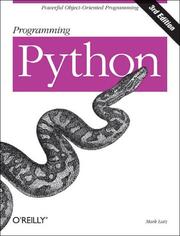| Listing 1 - 3 of 3 |
Sort by
|

ISBN: 9780596009250 0596009259 Year: 2008 Publisher: Sebastopol, CA : O'Reilly,
Abstract | Keywords | Export | Availability | Bookmark
 Loading...
Loading...Choose an application
- Reference Manager
- EndNote
- RefWorks (Direct export to RefWorks)
Book
ISBN: 9781849965378 1849965366 9781849965361 1849965374 Year: 2011 Publisher: London : Springer London : Imprint: Springer,
Abstract | Keywords | Export | Availability | Bookmark
 Loading...
Loading...Choose an application
- Reference Manager
- EndNote
- RefWorks (Direct export to RefWorks)
Computer programming is a skill that can bring great enjoyment from the creativity involved in designing and implementing a solution to a problem. This classroom-tested and easy-to-follow textbook teaches the reader how to program using Python, an accessible language which can be learned incrementally. Through an extensive use of examples and practical exercises, students will learn to recognize and apply abstract patterns in programming, as well as how to inspect the state of a program using a debugger tool. Features: Contains numerous examples and solved practice exercises designed for an interactive classroom environment Highlights several patterns which commonly appear in programs, and presents exercises that reinforce recognition and application of these patterns Introduces the use of a debugger, and includes supporting material that reveals how programs work Presents the Tkinter framework for building graphical user interface applications and event-driven programs Provides helpful additional resources for instructors at the associated website: http://cs.luther.edu/~leekent/CS1 This hands-on textbook for active learning in the classroom will enable undergraduates in computer science to develop the necessary skills to begin developing their own programs. It employs Python as the introductory language due to the wealth of support available for programmers. Dr. Kent D. Lee is Associate Professor of Computer Science at the Department of Computer Science at Luther College, Decorah, Iowa, USA. He is the author of the successful Springer textbook, Programming Languages: An Active Learning Approach.
Programming --- programmeertalen --- Python (Computer program language). --- Python (programmeertaal). --- Computer science. --- Programming Languages, Compilers, Interpreters. --- Informatics --- Science --- Python (Computer program language) --- Programming languages (Electronic computers). --- Computer languages --- Computer program languages --- Computer programming languages --- Machine language --- Electronic data processing --- Languages, Artificial
Book
ISBN: 9789463440233 9463440232 Year: 2017 Publisher: Leuven Acco
Abstract | Keywords | Export | Availability | Bookmark
 Loading...
Loading...Choose an application
- Reference Manager
- EndNote
- RefWorks (Direct export to RefWorks)
This book teaches you to write small programs to solve computational problems, i.e. problems for which we can compute a solution in a series of steps. The book first explains how to write computer programs in an iterative way. The program then uses iterative statements that execute the same sequence of instructions over and over again under slightly changing conditions. Hereafter, the book explains how to write recursive programs as an alternative for iterative programs. In a recursive program, a function to solve a problem invokes itself over and over again on simpler and simpler versions of the original problem. Recursive programs often lead to very concise implementations of complex algorithms. The book uses Python as its programming language. In teaching basic programming to thousands of students, we experienced that Python is particularly suited to introduce people to the art of programming. Python is a scripting language, which makes it extremely simple to experiment with small fragments of code. The book contains about a hundred experiments to get a good grip on the different concepts of the language. Contrary to mainstream languages such as Java and C#, Python is an untyped language. As a Python programmer, you do not have to specify the kind of information that you store in variables or that you pass to functions. Typed languages such as Java and C# are definitely more difficult to learn and to use. Moreover, the benefits you get from checking typed programs only really come to the fore in larger software systems. The book is not about Python. In fact, some of the more advanced concepts of the language are not even explained. Emphasis is on developing algorithms to solve computational problems and to implement them using mainstream concepts offered by all modern programming languages. In this way, you are able to switch to other programming languages to implement your algorithms. The book discusses the general technique of "divide and conquer" to manage the complexity of computer programs. This technique suggests to split complex functions into less complex functions, until you reach a stage in which the implementation is straightforward to work out. The book also explains more specific techniques such as backtracking and dynamic programming to solve more specific kinds of problems. The final part of the book introduces more advanced topics in writing small programs. It first of all discusses how to reason about the correctness and the efficiency of computer programs. The book ends with an introduction to functional programming and to object-oriented programming. Functional programming offers facilities to describe solutions rather than how to compute them. There is a definite tendency to extend mainstream languages with concepts for functional programming. Object-oriented programming offers more advanced concepts such as classes to structure larger software systems.
Programming --- programming [function] --- Langages de programmation (Ordinateurs) --- Programmeertalen (Computers) --- Programming languages (Electronic computers) --- 681.3*D32 --- 681.3*D32 language classifications: applicative languages; data-flow languages; design languages; extensible languages; macro and assembly languages; nonprocedural languages; specialized application and very high-level languages (Programminglanguages) --- language classifications: applicative languages; data-flow languages; design languages; extensible languages; macro and assembly languages; nonprocedural languages; specialized application and very high-level languages (Programminglanguages) --- Python (programmeertaal)
| Listing 1 - 3 of 3 |
Sort by
|

 Search
Search Feedback
Feedback About
About Help
Help News
News